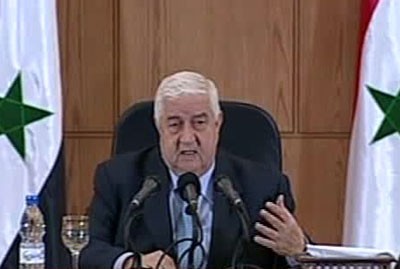Syrian Foreign Minister, Walid Al-Moallem, held a press conference on Tuesday, in which he assured that it was of national interest to reveal the truth about what happened in eastern Ghouta.
Syrian Foreign Minister, Walid Al-Moallem, held a press conference on Tuesday, in which he assured that it was of Syria's national interest to reveal the truth about what happened in eastern Ghouta, pointing out that US secretary of State, John Kerry, had called him on Thursday after two years and a half of rupture, and that the phone call was “friendly”.
 Moallem said that the UN team did not specify at first the locations it wanted to visit in Syria, but the opposing coalition was the part which specified the four locations that the inspectors visited.
Moallem said that the UN team did not specify at first the locations it wanted to visit in Syria, but the opposing coalition was the part which specified the four locations that the inspectors visited.
He further indicated that snipers had shot at the UN team in the regions under the control of armed groups, adding that Damascus said it was committed to the security of the delegations in the regions that are under its own control.
“They asked to go to the regions that are under the armed groups’ control, and when they reached there, they faced gunshots and failed to continue their visit, because the armed groups have not agreed among each other on ensuring the team’s security,” Moallem added.
The Syrian foreign minister reassured that his country had not used chemical weapons, stating that “no country in the world would use chemical weapons against its own people… if they wanted to wage an attack on Syria, the pretext of chemical weapons is inaccurate and vague, and I dare them to reveal their evidence first.”
Moallem assured that the Western threats would have no affect on the Syrian National Army’s achievements on ground, considering that “if they aim by these threats to spread fear among people, then they are mistaken, as no attack would break the bond between the people, Army and leadership in Syria.”
“Any war will be serving the goals of Al-Nusra front, which is related to Al-Qaeda. Hence, any attack would first serve the goals of Israel, which is something the US is proud to reveal, and would secondly serve the goals of Al-Qaeda.”
Regarding the Turkish stance on Western threats of attacking Syria, Moallem said he will not comment on Turkish Foreign Minister Ahmet Davutolgu’s statement in which he said that Anqara will take part in any military intervention in Syria.
However, he said that “the Egyptian crisis shook the balance of the Turkish leadership, and an attack on Syria will only deepen it.”
As for Jordan, the Syrian foreign minister asserted that the neighboring country did not have any benefit in being part of any attack on Syria, as “Jordan’s benefit requires standing by Syria, because its security is related to the security of Syria.”
Responding to journalists’ questions, Moallem pointed out that “since the beginning, neither the US nor Israel wanted a political solution in Syria, and this is why the US cancelled a near meeting with Russia on the Syrian crisis.
As he emphasized Damascus’s ultimate trust in its Russian ally, Moallem stated that “Russia is part of our steadfastness”.
“Let’s not disregard that this is the first time in history in which Russia and China use Veto for three times in rejection of any action against Syria like the case was in Lebanon,” he added.
The Syrian foreign minister also answered a question on UN Under-Secretary-General for Political Affairs, Jeffrey Feltman’s visit to the Islamic Republic of Iran, emphasizing that “Feltman will not close any deal with Iran. We are certain that our Iranian allies will not close any deal behind our back.”
Moreover, he highlighted that “what has been taking place in Syria and Iraq is an implementation of a policy drawn in 2009 to reach Tehran.”
Moallem reassured repeatedly that he was not sealed there will be a military action against Syria. However, he reiterated that “we have two choices, either to surrender, or to defend ourselves, and we will definitely defend ourselves with the available tools, as we did in the past, and we will surprise the world with these tools.”
On the Syrian Army’s operation in Ghouta, Moallem referred to the significance of this operation, indicating that “it is a major operation which will relieve the residents of Damascus.”
He also asserted that “the timing of the chemical issue was the result of our Armed Forces’ victories and strikes in Ghouta,” adding that “evidence on the militants’ use of chemical weapons, specifically in Ghouta, are available with us, but we will reveal them in the appropriate time.”
“The first time we called for a UN delegation to visit Syria and witness the evidence on the opposition’s use of chemical weapons; it took them five months to come. In these five months, the opposition attacked Khan Al-Assal, dug the graves of the victims of chemical weapons, and hid their bodies.”